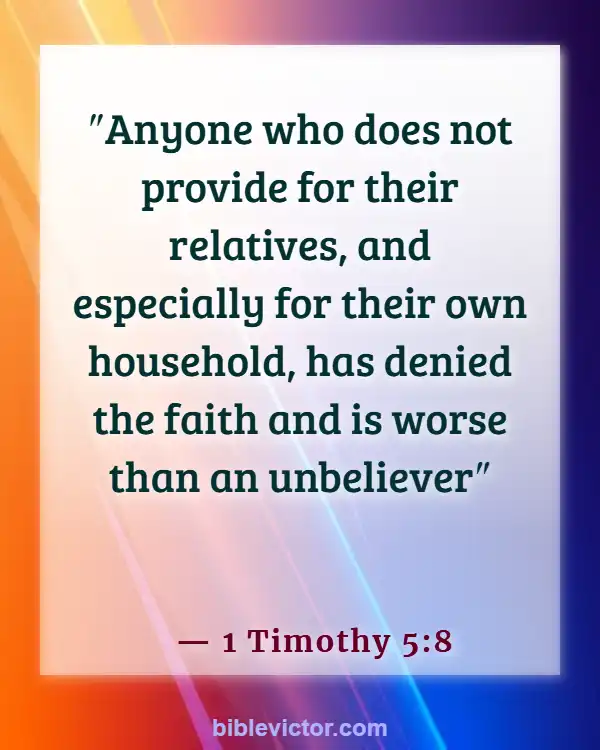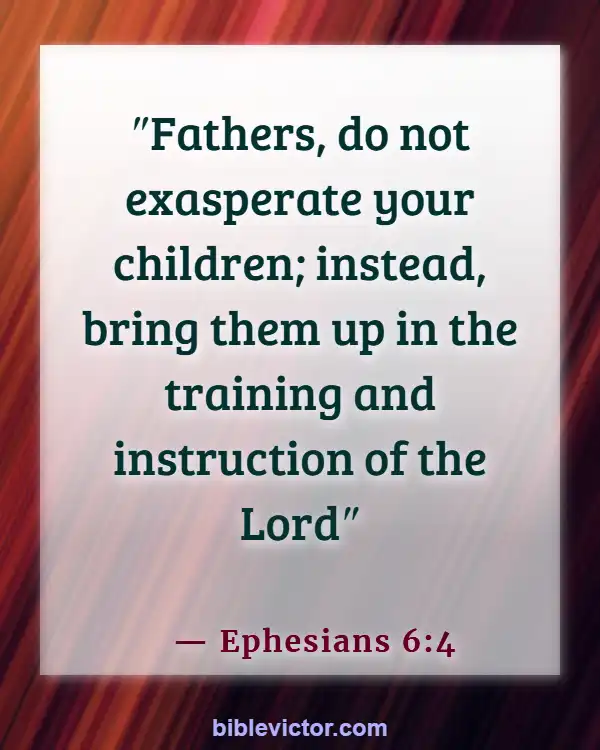Friends, if you’re seeking insight on “Bible Verses About Leaving Family For God,” this content is for you. Today, I share Bible verses that will help you better understand this challenging aspect of faith according to the Bible. These scriptures explore the concept of prioritizing one’s relationship with God, even when it means distancing from family. They offer guidance on balancing familial obligations with spiritual devotion and highlight the sacrifices sometimes required in following God’s call. Let’s delve into what the Word says about leaving family for God.
Contents
- 1 Introduction
- 2 What Does the Bible Say About Prioritizing God Over Family?
- 3 Key Scriptures on Forsaking All to Follow Christ
- 4 How to Balance Family Responsibilities and Spiritual Calling
- 5 Examples of Biblical Figures Who Left Their Families for God
- 6 Understanding the Cost of Discipleship in Relation to Family
- 7 Reconciling God’s Command to Honor Parents with Leaving Family
- 8 Conclusion
Introduction
Dear brothers and sisters,
Today we’re diving into a profound topic: prioritizing our relationship with God, even when it challenges our earthly connections. It’s a journey that asks us to examine how we balance our love for family with our commitment to our faith.
When we speak of “leaving family for God,” it’s not about turning our backs on our loved ones. Instead, it’s about placing God at the forefront of our lives. Jesus taught that our love for Him should surpass all other affections, reminding us to keep our loyalty to God above everything else.
Consider the lives of His first followers. The disciples left their livelihoods and families to walk with Jesus, demonstrating the kind of commitment that prioritizes divine calling over personal comfort. Abraham, too, embarked on a journey away from his homeland, guided by faith in God’s promises. These stories are not about rejection but about embracing a greater purpose.
It’s important to remember that God doesn’t call us to neglect our families. We are meant to honor our parents and care for those we love. The challenge lies in integrating our faith into our daily lives, so that our devotion to God naturally enhances our family relationships.
Navigating this path requires wisdom and prayer. Sometimes, following God might lead to misunderstandings or even tensions within our families. Jesus Himself spoke of counting the cost of discipleship. Yet, He also assured us that whatever we sacrifice for His sake will be abundantly rewarded.
So, how do we live this out? It starts with self-reflection. Are there aspects of your life where God is calling you to step out in faith? Are there family expectations or traditions that might be holding you back from fully pursuing your spiritual journey? Reordering our priorities can be challenging, but putting Christ first is always worth it.
As you ponder these questions, trust that God will grant you the grace and courage needed to follow Him wholeheartedly. Remember, the aim is not to create distance in our relationships but to bring them into alignment with God’s will.
If you find this message resonates with you, consider sharing it with others who might be seeking the same encouragement. Let’s support one another as we strive to honor God above all else.
Thank you for reflecting on this with me. May God bless you as you seek to live a life that glorifies Him.
What Does the Bible Say About Prioritizing God Over Family?
In the Christian faith, the concept of prioritizing God over family can be challenging to understand. The Bible often emphasizes the importance of putting God first in all aspects of life, which can sometimes mean making difficult choices that may seem contrary to familial obligations. This principle is rooted in the belief that one’s relationship with God transcends all earthly ties, including those with family members. The idea is not to neglect family responsibilities but to ensure that they do not supersede one’s devotion to God. This prioritization is about aligning one’s life according to God’s will, trusting that He will guide and provide for both spiritual needs and family responsibilities. By placing God at the forefront, believers can find strength and guidance to navigate complex family dynamics, ensuring that their actions reflect their faith and commitment to God.

“He that loveth father or mother more than me is not worthy of me: he that loveth son or daughter more than me is not worthy of me”— Matthew 10:37

“If any man come to me, hate not his father, mother, wife, children, brethren, sisters, yea, his own life also, he cannot be my disciple”— Luke 14:26
“Jesus answered said, Verily I say unto you, There is no man that hath left house, or brethren, or sisters, or father, or mother, or wife, or children, or lands, for my sake, the gospel’s”— Mark 10:29

“Every one that hath forsaken houses, or brethren, or sisters, or father, or mother, or wife, or children, or lands, for my name’s sake, shall receive an hundredfold, shall inherit everlasting life”— Matthew 19:29
Key Scriptures on Forsaking All to Follow Christ
The call to forsake all to follow Christ is a recurring theme in the New Testament, inviting believers to surrender everything for the sake of the Gospel. This does not imply a literal abandonment of family or possessions but rather an internal shift where Christ becomes the ultimate treasure and priority. The call to discipleship involves a willingness to let go of anything that might hinder one’s relationship with Jesus, including personal ambitions, relationships, and material possessions. By forsaking all, believers demonstrate their trust in Christ’s sufficiency and their dedication to living a life that reflects His teachings. This radical commitment is central to the Christian journey, as it signifies a transformation where one’s identity and purpose are found solely in Christ.

“He said to them all, If any man will come after me, let him deny himself, take up his cross daily, follow me”— Luke 9:23

“When he had called the people unto him with his disciples also, he said unto them, Whosoever will come after me, let him deny himself, take up his cross, follow me”— Mark 8:34

“Then said Jesus unto his disciples, If any man will come after me, let him deny himself, take up his cross, follow me”— Matthew 16:24
“He said unto them, Verily I say unto you, There is no man that hath left house, or parents, or brethren, or wife, or children, for the kingdom of God’s sake”— Luke 18:29
“Then Jesus beholding him loved him, said unto him, One thing thou lackest: go thy way, sell whatsoever thou hast, give to the poor, thou shalt have treasure in heaven: come, take up the cross, follow me”— Mark 10:21
How to Balance Family Responsibilities and Spiritual Calling
Balancing family responsibilities with a spiritual calling can be a delicate task for many believers. The Bible offers guidance on how to navigate these sometimes conflicting demands. The key is to approach each aspect of life with wisdom and discernment, recognizing that both family and spiritual commitments are important in God’s eyes. It’s about integrating faith into daily life, so that spiritual growth and family care are not seen as separate or competing priorities. Instead, they complement and strengthen each other. Believers are encouraged to seek God’s guidance in decision-making, ensuring that their actions are aligned with His will. This balance allows individuals to fulfill their roles within the family while actively pursuing their spiritual calling, ultimately leading to a more harmonious and fulfilling life.

“But if any provide not for his own, specially for those of his own house, he hath denied the faith, is worse than an infidel”— 1 Timothy 5:8

“Ye fathers, provoke not your children to wrath: but bring them up in the nurture admonition of the Lord”— Ephesians 6:4

“Train up a child in the way he should go: when he is old, he will not depart from it”— Proverbs 22:6

“Fathers, provoke not your children to anger, lest they be discouraged”— Colossians 3:21
“But I would have you without carefulness. He that is unmarried careth for the things that belong to the Lord, how he may please the LordBut he that is married careth for the things that are of the world, how he may please his wifeThere is difference also between a wife a virgin. The unmarried woman careth for the things of the Lord, that she may be holy both in body in spirit: but she that is married careth for the things of the world, how she may please her husband”— 1 Corinthians 7:32-34
Examples of Biblical Figures Who Left Their Families for God
The Bible is filled with stories of individuals who made the difficult choice to leave their families behind to pursue God’s calling. These examples serve as powerful testimonies of faith and obedience. Abraham, for instance, was called by God to leave his homeland and family to go to a land that God would show him. Similarly, the disciples of Jesus left their families and livelihoods to follow Him. These stories illustrate the profound trust and commitment required to follow God’s plan, even when it means leaving behind the familiar and comfortable. These biblical figures serve as models of faith, demonstrating that God’s purposes often require personal sacrifice but lead to greater blessings and fulfillment in His service.

“Now the Lord had said unto Abram, Get thee out of thy country, from thy kindred, from thy father’s house, unto a land that I will shew thee”— Genesis 12:1
“They straightway left their nets, followed himAnd going on from thence, he saw other two brethren, James the son of Zebedee, John his brother, in a ship with Zebedee their father, mending their nets; he called themAnd they immediately left the ship their father, followed him”— Matthew 4:20-22

“When they had brought their ships to land, they forsook all, followed him”— Luke 5:11
“By faith Abraham, when he was called to go out into a place which he should after receive for an inheritance, obeyed; he went out, not knowing whither he went”— Hebrews 11:8
Understanding the Cost of Discipleship in Relation to Family
The cost of discipleship is a concept that underscores the sacrifices involved in following Christ, which can include difficult decisions regarding family relationships. Jesus frequently spoke of the need to count the cost before committing to discipleship, emphasizing that following Him might require a reordering of one’s priorities. This cost is not about abandoning family but prioritizing one’s commitment to Christ above all else. It involves a willingness to endure hardships, face misunderstandings, and even suffer for the sake of the Gospel. Through this lens, discipleship is seen as a journey that demands total allegiance to Christ, with the understanding that the eternal rewards far outweigh the temporal sacrifices.

“For which of you, intending to build a tower, sitteth not down first, counteth the cost, whether he have sufficient to finish it?”— Luke 14:28
“He that taketh not his cross, followeth after me, is not worthy of me”— Matthew 10:38

“Jesus said unto him, No man, having put his hand to the plough, looking back, is fit for the kingdom of God”— Luke 9:62
“But Jesus said unto him, Follow me; let the dead bury their dead”— Matthew 8:22
“But what things were gain to me, those I counted loss for ChristYea doubtless, I count all things but loss for the excellency of the knowledge of Christ Jesus my Lord: for whom I have suffered the loss of all things, do count them but dung, that I may win Christ”— Philippians 3:7-8
Reconciling God’s Command to Honor Parents with Leaving Family
The Bible presents a nuanced view on the relationship between honoring parents and leaving family for God’s sake. While believers are commanded to honor their parents, this does not conflict with the call to prioritize God above all else. Honoring parents involves respecting and caring for them, but it does not mean that one’s allegiance to God should be compromised. The challenge lies in balancing these responsibilities, ensuring that honoring parents does not become an idol that supersedes one’s devotion to God. Ultimately, believers are encouraged to seek God’s wisdom in navigating these relationships, trusting that He will provide the grace and guidance needed to honor both family obligations and their spiritual calling.

“Honour thy father thy mother: that thy days may be long upon the land which the Lord thy God giveth thee”— Exodus 20:12
“Children, obey your parents in the Lord: for this is rightHonour thy father mother; which is the first commandment with promise”— Ephesians 6:1-2

“For God commanded, saying, Honour thy father mother: , He that curseth father or mother, let him die the death”— Matthew 15:4

“Children, obey your parents in all things: for this is well pleasing unto the Lord”— Colossians 3:20
“He said unto them, How is it that ye sought me? wist ye not that I must be about my Father’s business?they understood not the saying which he spake unto themAnd he went down with them, came to Nazareth, was subject unto them: but his mother kept all these sayings in her heart”— Luke 2:49-51
Conclusion
In conclusion, the Bible’s teachings on leaving family for God challenge us to examine our priorities and deepen our commitment to faith. While honoring family is important, these verses remind us that our ultimate allegiance must be to God. This doesn’t mean abandoning our loved ones, but rather aligning our relationships within the context of our spiritual journey.
By studying these scriptures, we learn to balance our earthly responsibilities with our heavenly calling. We’re encouraged to cultivate a faith strong enough to withstand difficult choices and potential sacrifices. The examples of biblical figures who left their families for God inspire us to trust in His plan, even when it seems daunting.
Applying these lessons to our lives requires discernment and prayer. We must seek God’s guidance in understanding how to honor both Him and our families. This may involve setting boundaries, making tough decisions, or redefining relationships. Ultimately, embracing this teaching can lead to a more profound spiritual life and a clearer sense of purpose.
As we navigate these complex waters, we’re reminded that God’s love is all-encompassing. By prioritizing our relationship with Him, we often find ourselves better equipped to love and serve our families and others around us.

